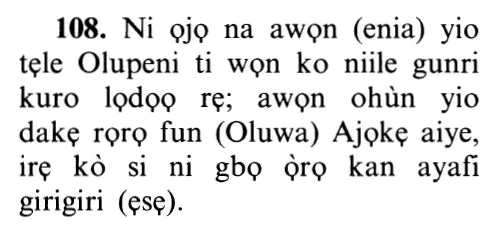20vs108
Select any filter and click on Go! to see results
Yoruba Translation

Hausa Translation
A rãnar nan sunã biyar mai kira, bãbu karkata a gare shi, kuma sautuka suka yi kawaici ga Mai rahama, bã ka sauraren kõme fãce sautin tafiya.
Asbabu n-Nuzuul (Occasions of Revelation)
The People will rush towards the Voice of the Caller
Allah says,
يَوْمَئِذٍ يَتَّبِعُونَ الدَّاعِيَ لَا عِوَجَ لَهُ ...
On that Day mankind will follow strictly Allah's caller, no crookedness will they show him.
On the Day, they see these conditions and these frightening sights, they will hastily respond to the caller. Wherever they are commanded to go, they will rush to it. If they had been like this in the worldly life, it would have been more beneficial for them, but here it does not benefit them.
This is as Allah says,
أَسْمِعْ بِهِمْ وَأَبْصِرْ يَوْمَ يَأْتُونَنَا
How clearly will they see and hear, the Day when they will appear before Us! (19:38)
Allah also says,
مُّهْطِعِينَ إِلَى الدَّاعِ
hastening towards the caller. (54:8)
Concerning Allah's statement,
... وَخَشَعَت الْأَصْوَاتُ لِلرَّحْمَنِ ...
And all voices will be humbled for the Most Gracious,
Ibn Abbas said,
"This means they will be silent.''
As-Suddi also said the same.
... فَلَا تَسْمَعُ إِلَّا هَمْسًا ﴿١٠٨﴾
And nothing shall you hear except Hamsa.
Sa`id bin Jubayr related that Ibn Abbas said,
"This means the steps of feet.''
Ikrimah, Mujahid, Ad-Dahhak, Ar-Rabi` bin Anas, Qatadah, Ibn Zayd and others all said the same.
Ali bin Abi Talhah said that Ibn Abbas said, فَلَا تَسْمَعُ إِلَّا هَمْسًا (And nothing shall you hear except Hamsa),
"Hamsa means a hidden voice.''
This has also been reported from Ikrimah and Ad-Dahhak. Sa`id bin Jubayr said, فَلَا تَسْمَعُ إِلَّا هَمْسًا (And nothing shall you hear except Hamsa),
"Hamsa means the secret speech and the steps of feet.''
" يومئذ يتبعون الداعي لا عوج له " أي يوم يرون هذه الأحوال والأهوال يستجيبون مسارعين إلى الداعي حيثما أمروا بادروا إليه ولو كان هذا في الدنيا لكان أنفع لهم ولكن حيث لا ينفعهم كما قال تعالى " أسمع بهم وأبصر يوم يأتوننا " وقال " مهطعين إلى الداعي " وقال محمد بن كعب القرظي يحشر الله الناس يوم القيامة في ظلمة ويطوي السماء وتتناثر النجوم وتذهب الشمس والقمر وينادي مناد فيتبع الناس الصوت يؤمونه فذلك قوله " يومئذ يتبعون الداعي لا عوج له " وقال قتادة لا عوج له لا يميلون عنه وقال أبو صالح لا عوج له لا عوج عنه وقوله وخشعت الأصوات للرحمن قال ابن عباس سكنت وكذا قال السدي فلا تسمع إلا همسا قال سعيد بن جبير عن ابن عباس يعني وطء الأقدام وكذا قال عكرمة ومجاهد والضحاك والربيع بن أنس وقتادة وابن زيد وغيرهم وقال علي بن أبي طلحة عن ابن عباس فلا تسمع إلا همسا الصوت الخفي وهو رواية عن عكرمة والضحاك وقال سعيد بن جبير فلا تسمع إلا همسا الحديث وسره ووطء الأقدام فقد جمع سعيد كلا القولين وهو محتمل أما وطء الأقدام فالمراد سعي الناس إلى المحشر وهو مشيهم في سكون وخضوع وأما الكلام الخفي فقد يكون في حال دون حال فقد قال تعالى " يوم يأت لا تكلم نفس إلا بإذنه فمنهم شقي وسعيد .
"يومئذ" أي يوم إذ نسفت الجبال "يتبعون" أي الناس بعد القيام من القبور "الداعي" إلى المحشر بصوته وهو إسرافيل يقول : هلموا إلى عرض الرحمن "لا عوج له" أي لاتباعهم : أي لا يقدرون أن لا يتبعوا "وخشعت" سكنت "الأصوات للرحمن فلا تسمع إلا همسا" صوت وطء الأقدام في نقلها إلى المحشر كصوت أخفاف الإبل في مشيها
يريد إسرافيل عليه السلام إذا نفخ في الصور
I'raab - grammatical analysis of the Qur'an
«يَوْمَئِذٍ» يوم ظرف متعلق بيتبعون وإذ ظرف مضاف إليه «يَتَّبِعُونَ» مضارع مرفوع بثبوت النون والواو فاعل «الدَّاعِيَ» مفعول به منصوب بالفتحة والجملة مضاف إليه «لا» نافية للجنس «عِوَجَ» اسم لا «لَهُ» متعلقان بالخبر المحذوف والجملة في محل نصب حال من الداعي «وَخَشَعَتِ» الواو استئنافية وفعل ماض والتاء للتأنيث «الْأَصْواتُ» فاعل «لِلرَّحْمنِ» متعلقان بخشعت والجملة استئنافية «فَلا» الفاء عاطفة «لا» نافية
َسْمَعُ» مضارع فاعله مستتر «إِلَّا» أداة حصر «هَمْساً» مفعول به لتسمع والجملة معطوفة
